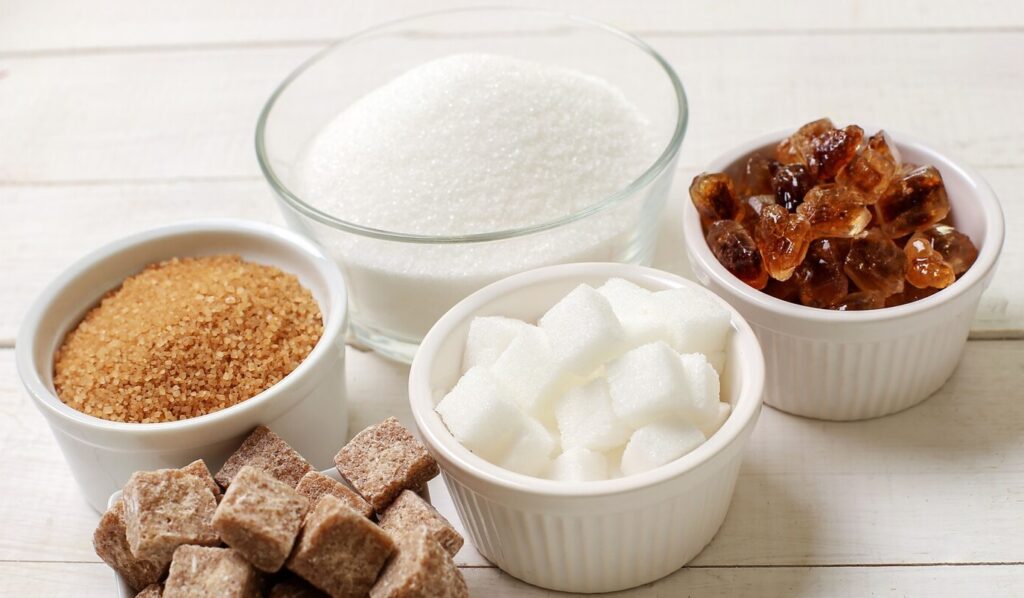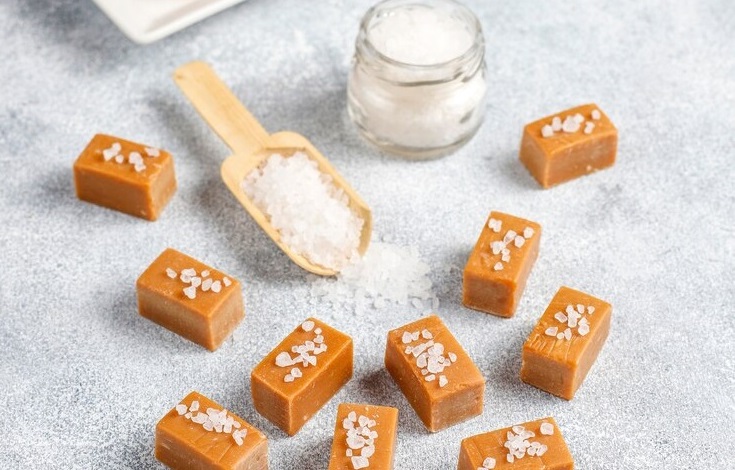Contents

Jaggery and sugar are both sweeteners, but they differ in their sources, processing, nutritional content, and flavor profiles.
Here’s a comparison between jaggery and sugar:
Jaggery:
Source: Jaggery is a natural sweetener made by concentrating sugarcane juice or palm sap. It undergoes minimal processing, and it retains some of the natural nutrients present in the original juice.
Nutritional Content: Jaggery contains small amounts of minerals such as iron, magnesium, potassium, and vitamins. It also retains some fiber from the plant material.
Processing: Jaggery is less refined compared to sugar. It is typically made by boiling down sugarcane juice or palm sap and then shaping it into blocks or cones.
Flavor Profile: Jaggery has a distinctive flavor with earthy and caramel-like notes. Its flavor is often described as richer and more complex compared to the neutral sweetness of sugar.
Glycemic Index: Jaggery generally has a lower glycemic index compared to sugar. Foods with a lower glycemic index cause a slower and steadier increase in blood sugar levels.
Color: The color of jaggery can range from golden brown to dark brown, depending on the processing and impurities present.
Sugar:
Source: Sugar, typically referred to as white sugar or table sugar, is commonly extracted from sugarcane or sugar beets. The refining process removes most of the impurities and nutrients.
Nutritional Content: Sugar is considered an “empty calorie” sweetener, as it lacks significant nutritional content. It provides only sucrose, a simple carbohydrate.
Processing: Sugar undergoes extensive processing, including extraction, purification, and crystallization. This process removes impurities, leaving behind pure sucrose.
Flavor Profile: Sugar has a neutral sweetness with no distinct flavor. It provides sweetness without adding additional taste notes to recipes.
Glycemic Index: Sugar has a higher glycemic index compared to jaggery, causing a more rapid increase in blood sugar levels when consumed.
Color: White sugar is typically pure sucrose and appears white or off-white. Brown sugar, another variety, contains molasses, giving it a brown color and a slightly different flavor.
Considerations: Jaggery is often considered a more natural and less processed alternative to sugar, offering small amounts of minerals and a unique flavor profile.
Sugar is commonly used in a variety of culinary applications due to its neutral taste and versatility.
Both sweeteners should be consumed in moderation as part of a balanced diet.
Ultimately, the choice between jaggery and sugar depends on personal preferences, dietary considerations, and the specific needs of a recipe. It’s essential to be mindful of overall sugar intake for health reasons.
Jaggery, a natural sweetener made from concentrated sugarcane juice or palm sap, offers several potential health benefits due to its nutritional content.
Here are some of the health benefits associated with consuming jaggery:
Rich in Minerals: Jaggery contains small amounts of essential minerals such as iron, magnesium, potassium, and vitamins. These minerals play vital roles in various physiological functions, including blood circulation, bone health, and enzyme activity.
Iron Boost: The iron content in jaggery may contribute to preventing iron deficiency anemia. Iron is essential for the production of hemoglobin and red blood cells.
Digestive Health: Jaggery is traditionally believed to stimulate digestive enzymes, promoting better digestion. It may help alleviate digestive issues and constipation.
Antioxidant Properties: Jaggery possesses antioxidant properties that can help neutralize free radicals in the body. Antioxidants play a role in reducing oxidative stress and supporting overall health.
Respiratory Health: In some traditional practices, jaggery is used to alleviate respiratory issues. It is believed to have a soothing effect on the respiratory system and may be used in remedies for conditions like coughs and colds.
Energy Boost: The natural sugars in jaggery, including sucrose and glucose, provide a quick energy boost. This can be particularly beneficial for individuals engaged in physical activities.
Immune System Support: Jaggery contains some minerals, including zinc, which plays a role in supporting the immune system. A well-functioning immune system is essential for overall health.
Menstrual Health: Some traditional practices suggest that consuming jaggery may help in managing menstrual symptoms. The iron content may contribute to addressing iron deficiencies associated with menstruation.
Detoxification: Jaggery is believed to help in the detoxification process by cleansing the liver. It is often included in certain traditional remedies for liver health.
Lower Glycemic Index: Jaggery generally has a lower glycemic index compared to refined sugar. Foods with a lower glycemic index cause a slower and steadier increase in blood sugar levels.
It’s important to note that while jaggery has potential health benefits, moderation is key. Excessive consumption of any sweetener, even a natural one like jaggery, can contribute to an unhealthy diet.
Jaggery and sugar are both sweeteners, but they differ in terms of their sources, processing methods, nutritional content, and flavor profiles.
Here’s a comparison between jaggery and sugar:
Source:
Jaggery: Derived from concentrated sugarcane juice or palm sap. Considered a more natural sweetener.
Sugar: Extracted from sugarcane or sugar beets. Undergoes extensive refining and processing.
Nutritional Content:
Jaggery: Contains small amounts of minerals such as iron, magnesium, potassium, and vitamins. Retains some fiber from plant material.
Sugar: Lacks significant nutritional content. Considered an “empty calorie” sweetener.
Processing:
Jaggery: Undergoes minimal processing, typically boiling down sugarcane juice or palm sap. Less refined compared to sugar.
Sugar: Undergoes extensive processing, including extraction, purification, and crystallization. Results in a highly refined product.
Flavor Profile:
Jaggery: Distinctive flavor with earthy and caramel-like notes. Adds richness and complexity to dishes.
Sugar: Neutral sweetness with no distinct flavor. Provides sweetness without additional taste notes.
Color:
Jaggery: Color ranges from golden brown to dark brown, depending on processing and impurities.
Sugar: White or off-white. Brown sugar contains molasses, providing a brown color.
Glycemic Index:
Jaggery: Generally has a lower glycemic index compared to sugar. Causes a slower and steadier increase in blood sugar levels.
Sugar: Has a higher glycemic index. Causes a more rapid increase in blood sugar levels when consumed.
Common Uses:
Jaggery: Used in various culinary applications, including sweets, desserts, and beverages. Commonly found in traditional dishes in many cultures.
Sugar: Widely used in a variety of foods and beverages. Versatile and suitable for various cooking and baking purposes.
Health Considerations:
Jaggery: Contains some minerals and may offer certain health benefits. Should be consumed in moderation due to its calorie content.
Sugar: High consumption linked to health issues such as obesity and metabolic disorders. Should be limited in a healthy diet.
Environmental Impact:
Jaggery: May have a lower environmental impact as it is less processed. Production methods can vary.
Sugar: Production processes may involve significant resource use and environmental impact. Depends on the agricultural and manufacturing practices.
In summary, while both jaggery and sugar are sweeteners, jaggery is often considered a more natural and less refined option with potential nutritional benefits. However, moderation is essential when using any sweetener, and individual dietary needs and preferences should be considered.
Chai with jaggery imparts a distinctive and rich flavor profile to the traditional tea. Jaggery, being a natural sweetener with its unique earthy and caramel-like notes, adds depth and complexity to the beverage.
Here’s how the flavor of chai with jaggery can be described:
Earthy and Caramel Notes: Jaggery brings in a natural sweetness with earthy and caramel undertones, creating a more complex flavor compared to using regular sugar.
Warm and Comforting: The combination of tea, spices, and jaggery creates a warm and comforting drink that is perfect for cozy moments.
Balanced Sweetness: Jaggery provides sweetness without being overly sugary. It blends well with the spices and the robustness of the tea, creating a balanced sweetness in each sip.
Depth and Richness: The rich, natural sweetness of jaggery adds depth to the chai, enhancing the overall flavor profile. It’s a great way to enjoy a more nuanced and layered cup of tea.
Adaptable and Versatile: Chai with jaggery is versatile and can be adapted to personal taste preferences. You can adjust the quantity of jaggery based on how sweet you like your tea.
Nutty Undertones: Depending on the type of jaggery used, there might be subtle nutty undertones, contributing to the complexity of the flavor.
Traditional and Cultural Touch: In some cultures, using jaggery in chai has traditional significance. It adds a cultural touch to the beverage, connecting it to culinary practices and heritage.
Healthier Sweetening Option: Jaggery is considered a more natural and less refined sweetening option compared to white sugar, making chai with jaggery a choice for those seeking a healthier alternative.
When making chai with jaggery, it’s essential to find the right balance for your taste preferences. You can experiment with the quantity of jaggery, the type of tea leaves, and the addition of spices like ginger, cardamom, or cinnamon to tailor the chai to your liking. Overall, chai with jaggery offers a delightful and flavorful alternative to the more commonly sweetened chai with sugar.
Replacing sugar with jaggery in tea can offer several potential health benefits due to the natural and less refined nature of jaggery.
Here are some reasons why using jaggery in tea might be considered a healthier option:
Natural Sweetener: Jaggery is a natural sweetener made from concentrated sugarcane juice or palm sap. It undergoes minimal processing, retaining some of the natural nutrients present in the original juice.
Rich in Minerals: Jaggery contains small amounts of minerals such as iron, magnesium, potassium, and vitamins. Replacing refined sugar with jaggery adds a subtle nutritional boost to your tea.
Lower Glycemic Index: Jaggery generally has a lower glycemic index compared to refined sugar. Foods with a lower glycemic index cause a slower and steadier increase in blood sugar levels.
Digestive Health: Jaggery is believed to stimulate digestive enzymes, aiding in digestion. Using jaggery in tea may contribute to digestive health.
Distinct Flavor Profile: Jaggery has a unique flavor with earthy and caramel-like notes. It adds depth and richness to your tea, creating a distinctive taste compared to tea sweetened with white sugar.
Antioxidant Properties: Tea itself, especially varieties like green tea, is known for its antioxidant properties. Combining tea with the natural sweetness of jaggery can offer a beverage rich in antioxidants.
Traditional and Cultural Significance: In some cultures, using jaggery in tea has traditional significance. It can connect your beverage choices to culinary practices and heritage.
Potential Respiratory Benefits: In traditional practices, jaggery is used to alleviate respiratory issues. Adding jaggery to tea may have a soothing effect on the respiratory system.
Versatility: Jaggery is versatile and can be used in various recipes, including tea. It dissolves easily in hot liquids, making it a convenient substitute for sugar.
Healthier Lifestyle Choice: Choosing jaggery over refined sugar aligns with a trend toward healthier lifestyle choices. It’s a step toward reducing the consumption of highly processed sweeteners.
While jaggery offers potential health benefits, it’s important to consume it in moderation. Excessive consumption of any sweetener, even a natural one like jaggery, can contribute to an unhealthy diet.
Natural, unprocessed jaggery, which is made from concentrated sugarcane juice or palm sap without the use of chemical additives or refining processes, offers several uses and potential health benefits.
Here are some reasons why natural jaggery is preferred by many:
Uses:
Sweetener in Culinary Dishes: Natural jaggery is widely used as a sweetener in various culinary applications. It adds a distinct flavor and sweetness to desserts, sweets, and savory dishes.
Tea and Beverages: Jaggery can be used as a natural sweetener in teas and beverages, providing a unique flavor profile to traditional beverages like tea and coffee.
Traditional Sweets and Confections: Jaggery is a key ingredient in the preparation of traditional sweets and confections in many cultures. It contributes to the richness and authenticity of these recipes.
Ayurvedic and Traditional Medicines: In traditional medicine systems like Ayurveda, jaggery is used as a base for various herbal and medicinal preparations. It is believed to have therapeutic properties.
Culinary Preservative: Jaggery is sometimes used as a natural preservative in pickles and certain food items. It helps extend the shelf life of these products.
Fermentation: Jaggery is used in the fermentation process for making certain traditional fermented foods and beverages like palm wine.
Chutneys and Sauces: Jaggery can be included in the preparation of chutneys and sauces, providing a balance of sweetness to complement the savory and tangy flavors.
Benefits:
Rich in Minerals: Natural jaggery contains small amounts of essential minerals such as iron, magnesium, potassium, and vitamins. These minerals contribute to overall health.
Digestive Health: Jaggery is believed to stimulate digestive enzymes, aiding in digestion. It is traditionally used to alleviate digestive issues and constipation.
Iron Boost: The iron content in jaggery may contribute to preventing iron deficiency anemia. Iron is essential for the production of hemoglobin and red blood cells.
Lower Glycemic Index: Jaggery generally has a lower glycemic index compared to refined sugar. Foods with a lower glycemic index cause a slower and steadier increase in blood sugar levels.
Antioxidant Properties: Jaggery possesses antioxidant properties that help neutralize free radicals in the body, potentially reducing oxidative stress.
Respiratory Health: In some traditional practices, jaggery is used to alleviate respiratory issues. It is believed to have a soothing effect on the respiratory system.
Sustainable and Less Processed: Natural jaggery is less processed compared to refined sugar, making it a more sustainable and environmentally friendly sweetening option.
Cultural and Culinary Significance: Natural jaggery has cultural and culinary significance in various regions, adding authenticity to traditional dishes and beverages.
While natural jaggery offers these potential benefits, it’s important to consume it in moderation as part of a balanced diet.

| Product List | Price List |
|---|---|
| CTC Tea | Buy Now |
| Green Tea | Buy Now |
| Flavoured Tea | Buy Now |
| Premix Tea | Buy Now |
| Yellow Tea(1 kg Pack) | Buy Now |
| Assam Tea(1 kg Pack) | Buy Now |
| Elaichi Tea(1 kg Pack) | Buy Now |
| Select Tea(500 Grams Pack) | Buy Now |
| Premium Tea(5 kg Pack) | Buy Now |
| Gold Tea(5 kg Pack) | Buy Now |
| Select Tea(250 Gram Pack) | Buy Now |
| Gold Tea(250 Gram Pack) | Buy Now |
| Green City Tea(250 Gram Pack) | Buy Now |
| Supreme Tea(250 Gram Pack) | Buy Now |
| Bobby Elaichi Tea(250 Gram Pack) | Buy Now |
| Elaichi Tea(250 Gram Pack) | Buy Now |
| Assam Tea(100 Gram Pack) | Buy Now |
| Amrutulya Masala Tea(500 gram Pack) | Buy Now |
| Amrutulya Masala Tea(1 KG Pack) | Buy Now |
| Chocolate Flavoured Tea | Buy Now |
| Mango Flavoured Tea | Buy Now |
| Cardamom Flavoured Tea | Buy Now |
| Masala Flavoured Tea | Buy Now |
| Pan Flavoured Tea | Buy Now |
| Lemongrass Flavoured Tea | Buy Now |
| Kesar Elaichi Flavoured Tea | Buy Now |
| Plain Kadak Tea | Buy Now |
| Ginger Tea | Buy Now |
| Tulsi(Basil) Tea | Buy Now |
| Rose Flavoured Tea | Buy Now |
| Irani Tea | Buy Now |
| Green Tea | Buy Now |
| Premix Tea | Buy Now |
| Jaggery(Gud) Tea | Buy Now |
| Lemon Tea | Buy Now |
| Noon Tea | Buy Now |
| Kashmiri Kawha | Buy Now |
| Kashmiri Tea | Buy Now |
A 1 kg pack should cost you anywhere from INR 200 to INR 400, depending upon its quality and brand.
Buy 100% Authentic and Delicious Tea from Solanki Tea – A brand based out of the Assam Region itself, Solanki Tea aims to bring the best of Assam exclusives at the fingertips of the worldwide audience.
Whether you have already tried Hotel dust Tea in Assam and are looking to relive the experience or want to try it for the first time, Solanki Tea is your place. The quality of our Assam Tea leaves is unmatched and hard to find elsewhere. Buy it once and we are sure you’ll come back for more Solanki tea. – Buy Now
Conclusion –
Keeping in mind all types of tea-loving people, we have detailed information about the best tea brands in today’s discussion. Hopefully, this will be a great help for them.

Wholesale, Bulk Tea Partner In Vashi, Navi Mumbai
1) Become A Wholesale Tea Partner In Vashi, Navi Mumbai With solanki Tea
2) Do you run a cafe, hotel, retail shop or a gift planner and have a regular need to procure the finest tea blends for your decerning customers.
3) As long as you are looking for the best quality teas, we at Solanki Tea are happy to extend our full support.
4) Solanki Tea is a premium tea wholesaler In Vashi, Navi Mumbai offering a vast selection of directly sourced teas from across India, after tasting by expert tea tasters.
5) We offer a great selection of exotic premium organic, loose hotel dust tea from Darjeeling, Assam, Sikkim, Kangra, Terai and Nepal at bulk and wholesale. As a wholesale loose leaf tea supplier In Vashi, Navi Mumbai, we assure that our teas are obtained from India’s various tea manufacturing regions, and unassuming to suit you and your customer’s palate. The competence, experience and expertise guarantees the finest teas at the most appropriate rates.
Contact Us
…………………
Solanki Tea Company Pvt. Ltd.
Address: L-29, APMC Masala Market, APMC Market, Sector 19, Vashi, Navi Mumbai, Maharashtra 400703
Phone Number: 09819680073
Website: https://www.solankitea.com/
GBP Profile: https://g.co/kgs/7dzKfDw
Social Profiles
…………………….
Facebook: https://www.facebook.com/solankiteeofficial/
Instagram: https://www.instagram.com/solankiteaofficial/
Twitter: https://twitter.com/SolankiTea
Pinterest: https://in.pinterest.com/solankitea/
Youtube: https://www.youtube.com/channel/UCfq0tk63fpygl6jIGR1Foiw/videos
We support small retailers worldwide who wish to purchase tiny quantities of the finest and most exotic retailing/online sales.
Get in touch today!

Tags: wholesale tea suppliers in Navi Mumbai, Largest wholesale Green Tea distributors in Navi Mumbai, Leading Green Tea manufacturers in Navi Mumbai, Major Green Tea brands in the Indian wholesale market, Popular Green Tea suppliers in Navi Mumbai, Prominent Green Tea companies for bulk orders in Navi Mumbai, Green Tea wholesalers in Navi Mumbai, Top Green Tea production companies in Navi Mumbai, Top Green Tea Manufacturers & Suppliers in Navi Mumbai